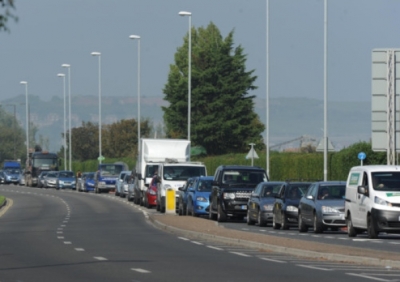
POOR AIR QUALITY: Southbound traffic on the Eastern Road heading for the city
Published in the Portsmouth News on 27th September 2013
Story by Jeff Travis
The air we breathe is a commodity many of us probably take for granted
It’s free and there seems to be no shortage of it.
But clean oxygen-filled air sustains all of us and is a major contributor to a healthy, long life.
Indeed, a government report in 2010 described poor air quality as ‘an invisible killer’, probably contributing to more deaths than obesity, traffic accidents and passive smoking.
Air quality is at the top of the agenda at Portsmouth City Council as it launches an action plan to improve the air we breathe – which we take in, on average, between 12 and 16 times every minute.
Five areas in the city are currently exceeding the EU limits for nitrogen dioxide – one of the most toxic pollutants from vehicles.
Portsmouth is by no means alone as other cities also struggle to combat pollutants, mainly exacerbated by Britons’ love affair with the humble automobile.
But it’s getting serious.
By 2015 the EU has threatened to hand out large fines for exceeding the legal limits, which is 40 micrograms of nitrogen dioxide per cubic metre of air (taken as an average over a 12-month period).
For every year the limits are breached, the UK could face fines of £300m.
Back in 2005, when air pollution regulations were being tightened, 13 congestion hotspots in the city were named as Air Quality Management Areas because of poor air quality.
Eight of these have been revoked after seeing improvements, partly due to advancements in exhaust technology.
But five areas still have higher than average levels of nitrogen dioxide – the area between the city centre and Gunwharf Quays, part of Portsea, London Road in Fratton and North End, the bottom of the Eastern Road in Milton, and Mile End Road.
Political leaders admit the physical geography of Portsmouth is one of the major hurdles for improving air quality – with almost 150,000 people packed on to a small island with only three roads on and off it.
Air pollution is monitored continuously at Gatcombe Park, London Road, Burrfields Road, and Mile End Road.
At a further 36 locations nitrogen dioxide is analysed using diffusion tubes, which contain a mesh to absorb the gas, allowing a reading to be taken.
Milton councillor Caroline Scott, who helped to lead a review on air quality at Portsmouth City Council, says: ‘We have poor air quality and it’s worse in some areas than others.
‘Trying to get people out of their cars and to reduce the amount of heavy goods traffic is incredibly hard.
‘I felt quite depressed through the review that I couldn’t really see a way forward.
‘It’s a bit like recycling – you get to a certain point and then it doesn’t go any higher, even though we try education.’
But the uphill battle will not stop city leaders trying, with park-and-ride schemes, education programmes and traffic remodelling in the offing.
Meanwhile, in Fareham, the council is keeping tabs on air quality in Gosport Road and Portland Street, where levels of nitrogen dioxide have exceeded 40 micrograms per cubic metre, and similarly in Havant, where levels of nitrogen dioxide are
hovering at the legal limits in Park Road North and South and Langstone Road.
The introduction of Low Emission Zones – areas which seek to restrict or deter access by certain polluting vehicles or only allow low emission vehicles – has been ruled out for now due to the impact on the local economy.
In Portsmouth, HGV’s alone cause around 45 per cent of nitrogen dioxide emissions, but are a major part of the city’s economy.
Traffic as a whole contributes to 70 per cent of the air pollution.
The evidence of air pollution’s effect on health is substantial.
It can trigger the onset of attacks of asthma, chronic bronchitis and other respiratory
diseases and long-term exposure can reduce
lung function and shorten life expectancy.
Portsmouth has high levels of both asthma and chronic obstructive pulmonary disease.
Average male life expectancy in Portsmouth is 77.5 years – marginally lower than the UK average of 78.1 years, while female life expectancy of 82.3 years is about the national average.
So, what can one do, short of vowing never to drive a car again?
Environmentalist Ray Cobbett, from Emsworth, said each of us can help improve the air we breathe by taking baby steps.
He says: ‘The atmosphere is only six miles thick – so it’s less than a coat of paint on a car.
‘It’s easily polluted and it is being polluted.
‘There’s no good guys in this. We are all contributing to it.
‘People can consciously take it upon themselves to reduce emissions.
‘They can walk, take the bus or cycle.
‘I am contributing to it as much as anyone else. Because I am conscious about it, I always ride my bike into Emsworth to do my shopping.
‘I feel that in a tiny way people like me, the millions of us, are playing our part in reducing emissions.’
Mr Cobbett says a more serious debate about air quality needs to be had in our country.
‘We have a really poor reputation on clean air,’ he says.
‘I don’t blame the council – I blame the government.
‘I think the government has been quite laid-back in addressing air quality. We could be risking fines from the EU.
‘The levels of compounds are distance related, so it’s important for children as to where they play and go to school.
‘It’s very important for people with respiratory problems to avoid fume-filled areas. It’s also important for where people live.’
WHAT IS BEING DONE
· Promoting energy-saving measures across the city.
· Workplace travel plans to promote car sharing and discounted public transport, as well as travel plans for school to reduce single pupil journeys.
· Promoting walking and cycling through new cycle routes, pavement widening, new pedestrian crossings and reducing speed limits on side roads.
· Park and ride scheme through regeneration of Tipner, offering 663 spaces and fast bus service into city.
· Extra traffic controls on the southbound M275 slip and Mile End Road.
· Junction improvements proposed at several locations, including London Road/Kingston Crescent and Fratton Road/Arundel Street.
· Restriction of HGV movements through North End.
· Consider introducing reduced parking costs for less polluting vehicles.
· Introduction of signage at key locations where drivers are encouraged to switch off engines when stationary for more than a minute or two.
· Explore new technologies to reduce nitrogen dioxide levels.
· The government has awarded Portsmouth City Council an air quality grant of £60,000 for a feasibility study to look at how to improve traffic flow in the city.
GASES MONITORED BY THE AUTHORITIES
Benzene – derived from coal and petroleum. Benzene is used in the manufacture of plastics, detergents, pesticides, and other chemicals. It has been linked to leukaemia.
Nitrogen dioxide and nitric oxide – road transport is the main source. Long term exposure may affect lung function and respiratory symptoms.
Sulphur dioxide – caused by combustion of fuels containing sulphur, such as coal and heavy oils by power stations and refineries. It causes constriction of the airways of the lung.
Lead – emitted from the combustion of coal and also iron and steel combustion. Exposure to high levels in air may result adverse effects on the kidneys, gastrointestinal tract, the joints and reproductive systems. Affects intellectual development in young children.
Carbon monoxide – biggest source is road transport. Substantially reduces capacity of the blood to carry oxygen to the body’s tissues and blocks important biochemical reactions in cells. People with angina are at particular risk.
1,3-butadiene – mainly from combustion of petrol. A recognised carcinogen, linked to lymphatic cancer and leukaemia.
Particles – Road transport gives rise to primary particles from engine emissions, tyre and brake wear and other non-exhaust emissions. Linked to respiratory and cardiovascular illness.

Follow Havant FOE